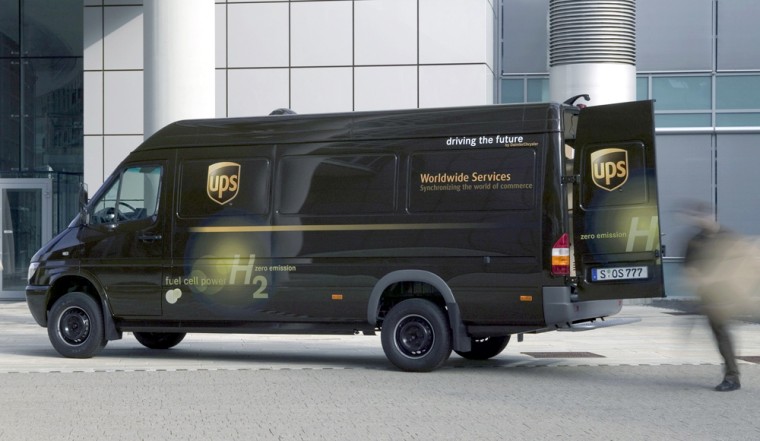Parcel delivery giant UPS on Thursday announced it was deploying three delivery vans that run on non-polluting hydrogen and fuel cells, and said it hopes to some day have zero-emission engines for its entire fleet of 88,000 vehicles.
The three vans will be used in Los Angeles, Sacramento, Calif., and Ann Arbor, Mich.
The move comes a year after UPS started the project along with DaimlerChrysler and the U.S. Environmental Protection Agency. DaimlerChrysler provided a fuel cell vehicle last year that UPS modified for delivery testing in Ann Arbor.
'Rapid application' promised
"Test programs showed the on-road reliability of fuel cell vehicles is excellent, equivalent to our current fleet," Chris Mahoney, UPS vice president for transportation services, said in a statement. "But what's truly exciting is how fast the technology is progressing."
"Shifting away from a fossil fuel based economy to a hydrogen economy would be a great environmental and technological achievement," Mahoney added. "We will continue the rapid application of this technology in hopes that in the near future, we can deploy zero-emission engines across our fleet of 88,000 vehicles."
The vehicles have a 155 mile range before they need to be refueled at a hydrogen station. Special graphics on the side of the vans feature rippling circles representing water — that's the only direct emission from fuel cells, which create electricity by having hydrogen react with oxygen.
Currently, hydrogen is produced from fossil fuels, creating some pollution at the front end and raising costs. Researchers hope to eventually extract it economically using renewable energy like solar and wind power.
Economic edge cited
The three vans are expensive prototypes, but Mahoney cited economic advantages to future fuel cell vehicles:
- A big reduction in maintenance costs since the electric drive trains on fuel cell vans will last longer than a gas or diesel vehicle.
- A 10 percent increase in cargo space compared to UPS' similar diesel vans.
- Fuel cells eliminate having to put an engine in the front of the vehicle, making it easier to explore new designs.
Mahoney also cited some of the remaining obstacles.
He acknowledged that "it's still more expensive to manufacture a fuel cell vehicle," but added that DaimlerChrysler, like most carmakers, are investing heavily in fuel cell R&D.
"The refueling infrastructure is the next critical need," he added. "Only by making hydrogen as broadly available as gasoline or diesel can passenger cars and fleets truly reap the environmental and economic benefits."
California Gov. Arnold Schwarzenegger has taken a lead in the United States, with a plan to have 150-200 refueling stations along major state roads by 2010.
